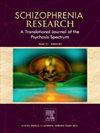Obsessive-compulsive symptoms and personal recovery in patients with schizophrenia spectrum disorders: A cross-sectional study
IF 3.6
2区 医学
Q1 PSYCHIATRY
引用次数: 0
Abstract
Background
Obsessive-compulsive symptoms (OCS) frequently co-occur in patients with Schizophrenia Spectrum Disorders (SSD). Patients with SSD and OCS experience increased clinical and social challenges, including diminished quality of life and subjective well-being. However, it is unknown whether co-morbid OCS are associated with personal recovery.
Aim
To investigate whether the presence and severity of OCS in patients with SSD is associated with lower self-reported personal recovery.
Methods
A cross-sectional design was employed, examining 527 patients with SSD. Group comparisons between patients with and without OCS for self-reported personal recovery (assessed with the Recovery Assessment Scale (RAS-24)) were conducted using analysis of covariance, adjusting for positive, negative and general symptoms. Multiple regression analyses were performed in 133 patients with co-occurring OCS to assess the additional explained variance in personal recovery by OCS severity after adjusting for the same covariates in the first block of the model.
Results
Group comparisons demonstrated that the presence of co-morbid OCS was associated with lower scores in personal recovery. Multiple hierarchical regression analyses showed that OCS severity was significantly associated with personal recovery by explaining an additional 3.0 % of variance in personal recovery.
Conclusion
Our findings suggest that co-occurring OCS in patients with SSD are relevant for personal recovery and that treatment should also address OCS.
求助全文
约1分钟内获得全文
求助全文
来源期刊

Schizophrenia Research
医学-精神病学
CiteScore
7.50
自引率
8.90%
发文量
429
审稿时长
10.2 weeks
期刊介绍:
As official journal of the Schizophrenia International Research Society (SIRS) Schizophrenia Research is THE journal of choice for international researchers and clinicians to share their work with the global schizophrenia research community. More than 6000 institutes have online or print (or both) access to this journal - the largest specialist journal in the field, with the largest readership!
Schizophrenia Research''s time to first decision is as fast as 6 weeks and its publishing speed is as fast as 4 weeks until online publication (corrected proof/Article in Press) after acceptance and 14 weeks from acceptance until publication in a printed issue.
The journal publishes novel papers that really contribute to understanding the biology and treatment of schizophrenic disorders; Schizophrenia Research brings together biological, clinical and psychological research in order to stimulate the synthesis of findings from all disciplines involved in improving patient outcomes in schizophrenia.
 求助内容:
求助内容: 应助结果提醒方式:
应助结果提醒方式:


